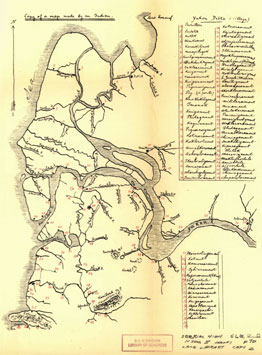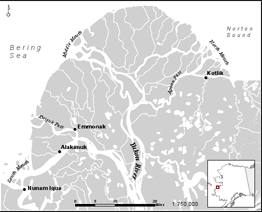Lawrence Edmund, Mark John, and Denis Sheldon at Akuluraq Slough, August 2011. Photo Credit: Ann Fienup-Riordan
Historic map of Yukon Delta settlements and seasonal camps, 1910. Jesuit Oregon Province Archives, Spokane, WA.
Kira and Ethan Wilkinson and Noah Andrew lashing a kayak frame together, Betel 2006. Photo Credit: Michael Whiteneck
Winnie Sheldon picking salmonberries south of Nunam Iqua, August 2011. Photo Credit: Ann Fienup-Riordan
The coastal plain of the Yukon-Kuskokwim delta, south of Scammon Bay, 2003. Photo Credit: Jeff Foley
Group photo taken at Manriq during our circumnavigation of Nelson Island, July 2007. Photo Credit: Ann Fienup-Riordan
Lakes to the south of Nelson Island, 2003. Photo Credit: Jeff Foley
The January 2012 meeting of the steering committee for CEC's project, "Nunamta Ellamta-Ilu Ayuqucia/What Our Land and World are Like." Photo Credit: Chris McNeave
A woman's sewing machine left on her grave at Qavaliriyaq on Nelson Island, July 2007. Photo Credit: Ann Fienup-Riordan
Grandma Nickoli Fox with all her family. Left to right, back row: Sam Fox, James Fox, and Joshua Pavila; front row: Emma Fox, Jenny Fox, Martha Mark, and Pauline Fox. Rhoda and Bill Thomas, Quinhagak 1940s, courtesy of Chet Williams.
Xenia and Josephine of Kasigluk, 1960s. Mabel and Harley McKeague Alaskan Collection, University of Deleware, Deleware Museum.
Ray Waska, Peter Moore, and Mark John at Nanvaruk, July 2001. Photo Credit: Ann Fienup-Riordan
Simeon Agnus points out a land feature near Arayakcaaq at the mouth of the Qalvinraaq River, July 2007. Michael John sits to his right and Theresa Abraham to his left. Photo Credit: Ann Fienup-Riordan



